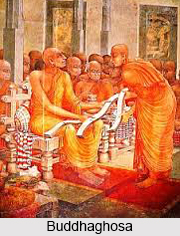 Buddhaghosa was a 5th-century Indian Theravada Buddhist commentator and scholar.
Buddhaghosa was a 5th-century Indian Theravada Buddhist commentator and scholar.
Buddhaghosa is best-known for his work Visuddhimagga "Path of Purification", a comprehensive summary and analysis of the Theravada understanding of Gautama Buddha`s path to liberation.
Interpretation by Buddhaghosa
The interpretations provided by Buddhaghosa have generally constituted the orthodox understanding of Theravada scriptures since at least the 12th century CE. He is generally recognized by both Western scholars and Theravadins as the most important commentator of the Theravada.
Works of Buddhaghosa
Buddhaghosa has three primary sources of information on the short prologues and epilogues attached to Buddhaghosa`s works. The details of his life recorded in the Mahavamsa, a Sri Lankan chronicle; and a later biographical work called the Buddhaghosuppatti. A few other sources discuss the life of Buddhaghosa, but do not appear to add any reliable material. Buddhaghosa was responsible for an extensive project of synthesizing and translating a large body of Sinhala commentaries on the Pali Canon.
Biographical Works of Buddhaghosa
The biographical excerpts attached to works attributed to Buddhaghosa reveal relatively few details of his life, but were presumably added at the time of his actual composition.
The biographical works of Buddhaghosa has largely identical in form in these short excerpts describe Buddhaghosa as having come to Sri Lanka from India and settled in Anuradhapura.
Mahavamsa Records on Buddhaghosa
The Mahavamsa records that Buddhaghosa was born into a Brahmin family in the kingdom of Magadha. He is said to have been born near Bodh Gaya, and to have been a master of the Vedas, travelling through India engaging in philosophical debates. Only upon encountering a Buddhist monk named Revata was Buddhaghosa bested in debate, first being defeated in a dispute over the meaning of a Vedic doctrine and then being confounded by the presentation of a teaching from the Abhidhamma. Impressed, Buddhaghosa became a Buddhism monk and undertook the study of the Tripitaka and its commentaries.
Buddhaghosa in Srilanka
In Sri Lanka, Buddhaghosa began to study what was apparently a very large volume of commentarial texts that had been assembled and preserved by the monks of the Anuradhapura Maha Viharaya. Buddhaghosa sought permission to synthesize the assembled Sinhalese-language commentaries into a comprehensive single commentary composed in Pali. The elder monks sought to first test Buddhaghosa`s knowledge by assigning him the task of elaborating the doctrine regarding two verses of the suttas; Buddhaghosa replied by composing the Visuddhimagga. His abilities were further tested when deities intervened and hid the text of his book, twice forcing him to recreate it from scratch. When the three texts were found to completely summarize all of the Tripitaka and match in every respect, the monks acceded to his request and provided Buddhaghosa with the full body of their commentaries.




















